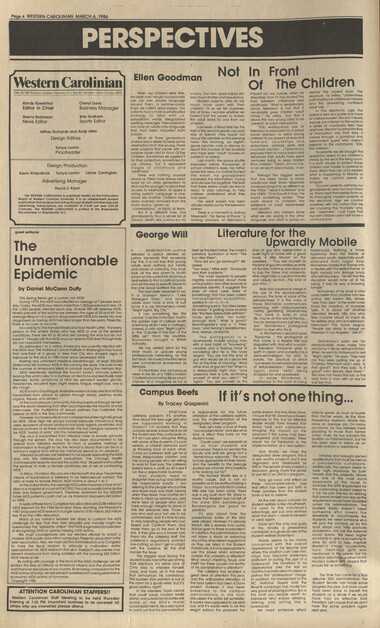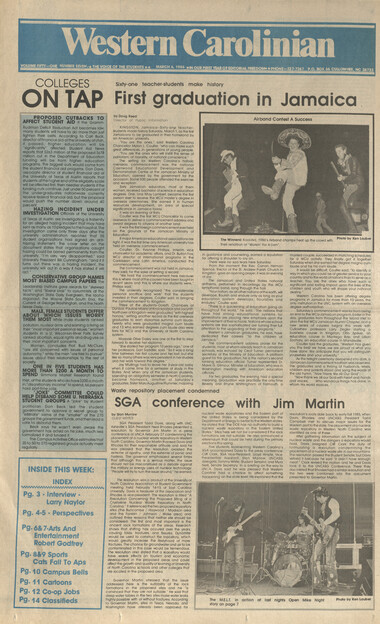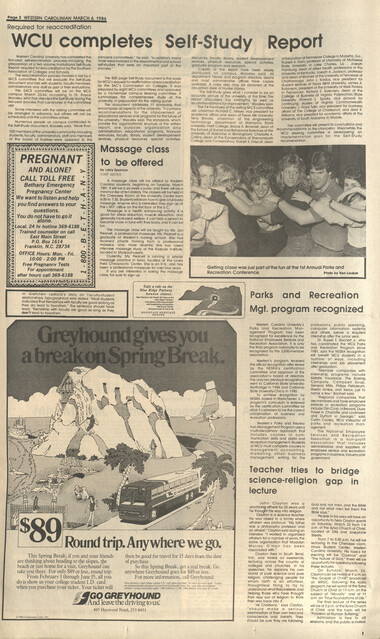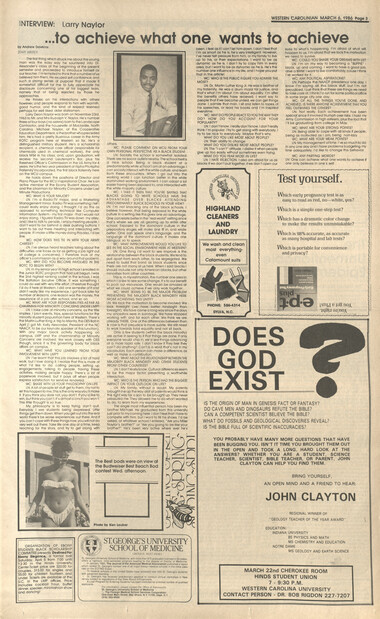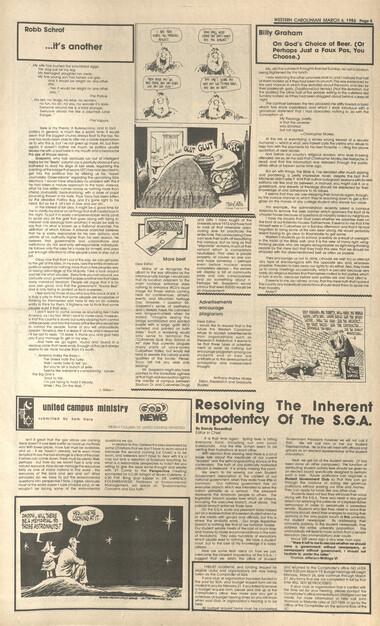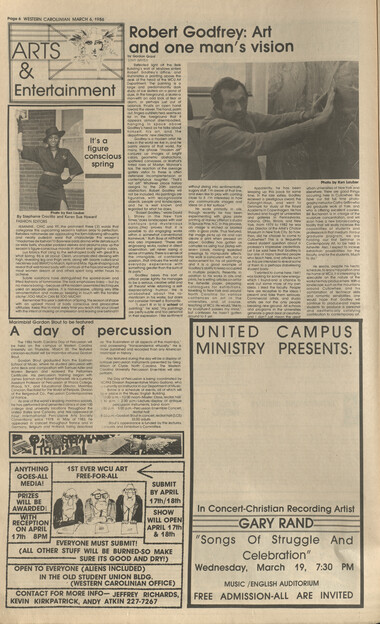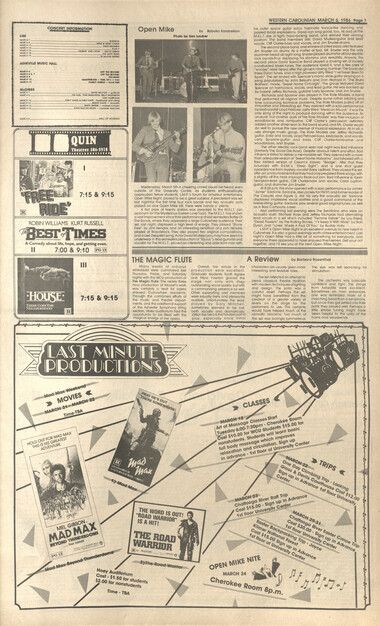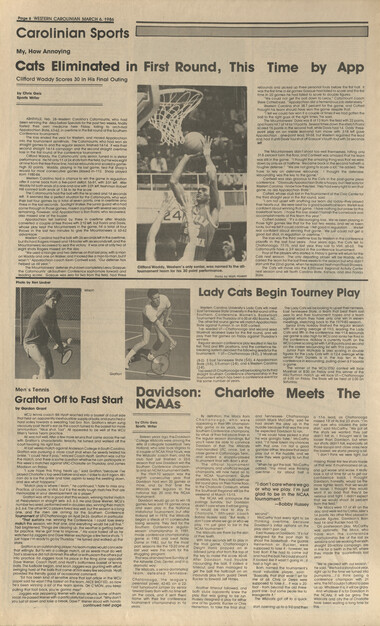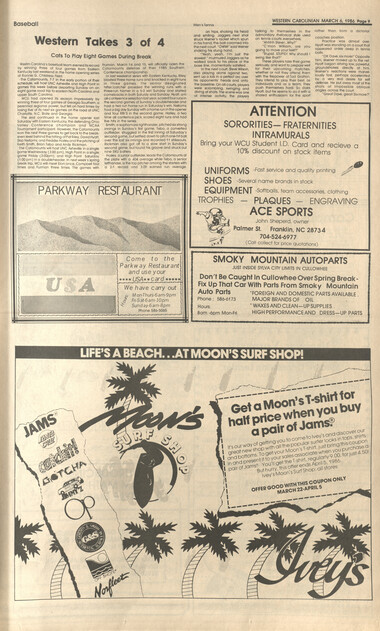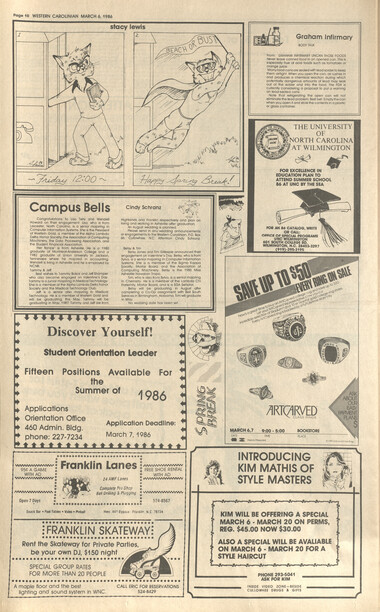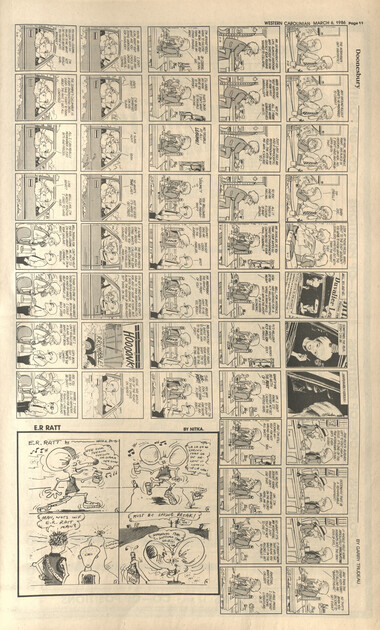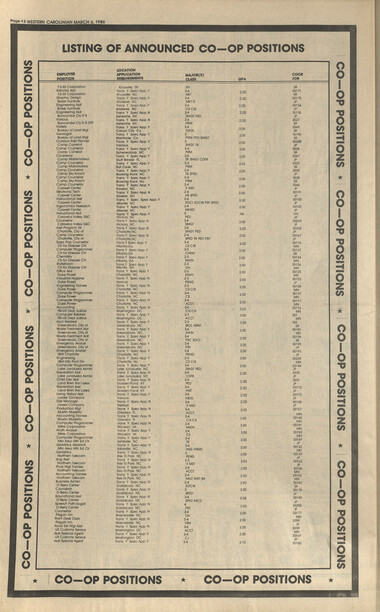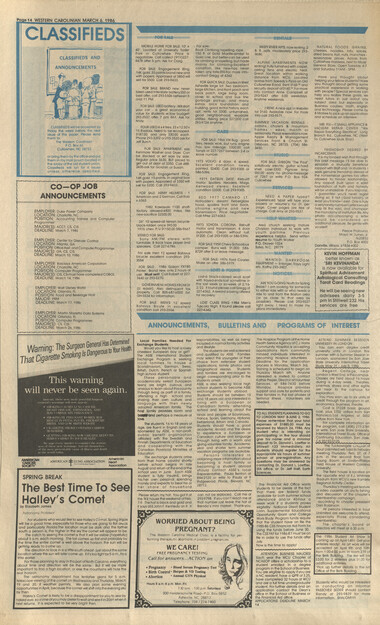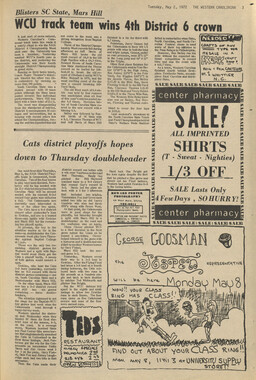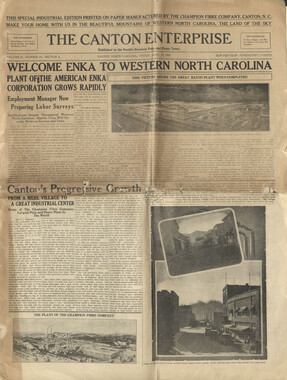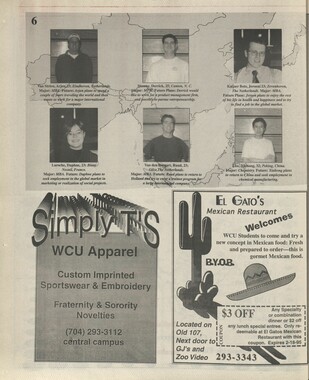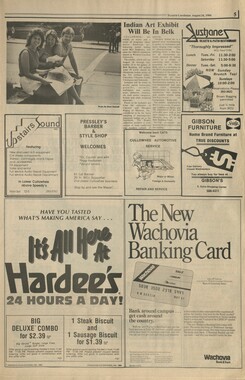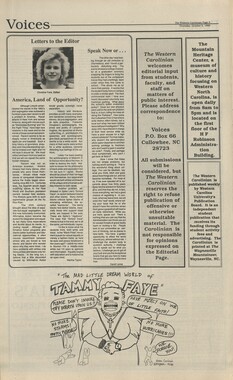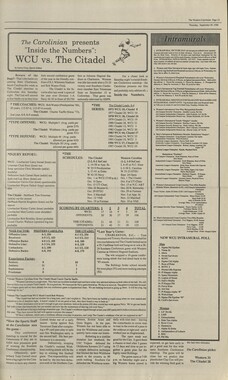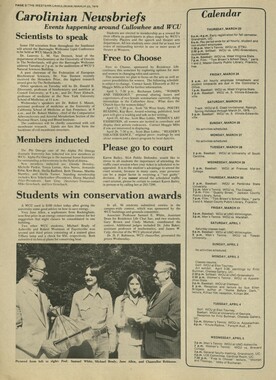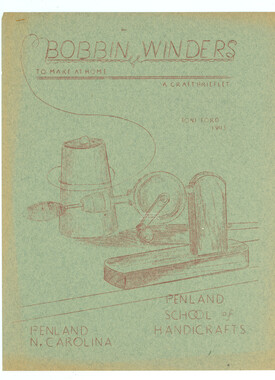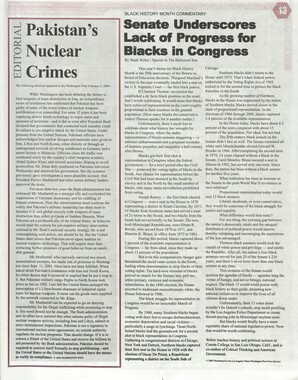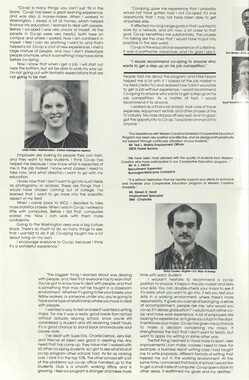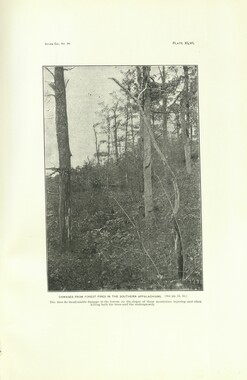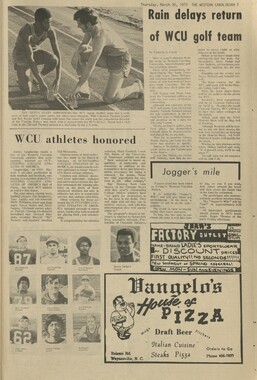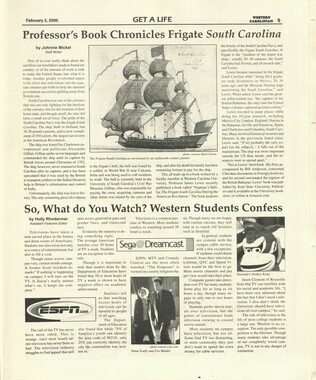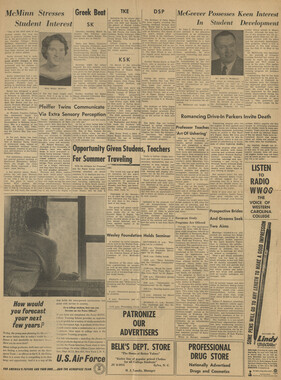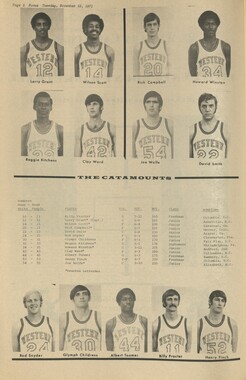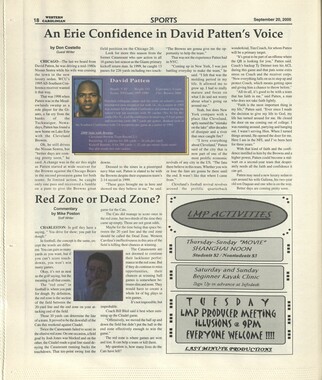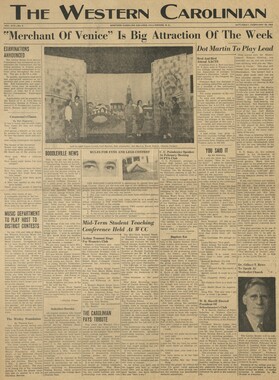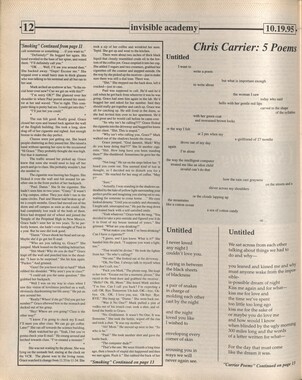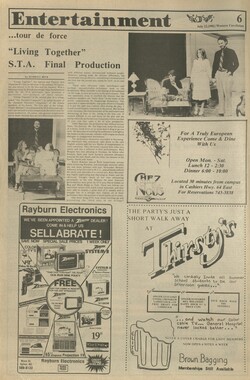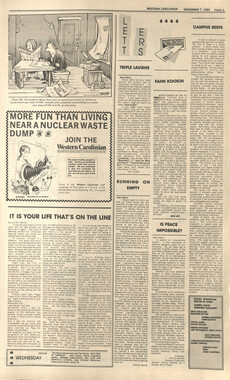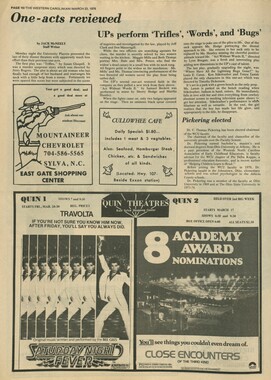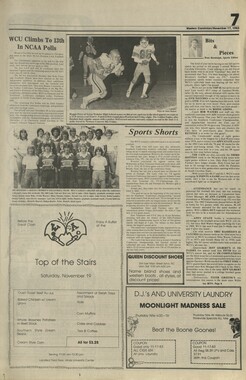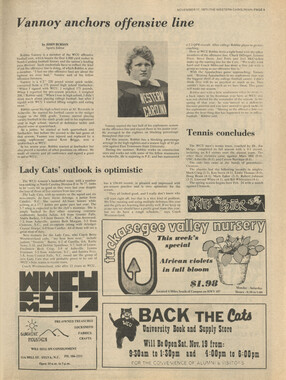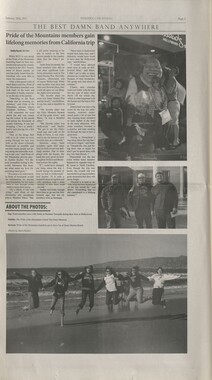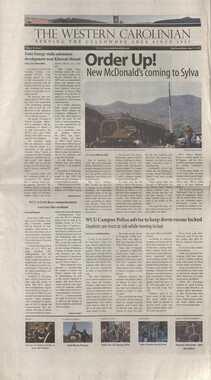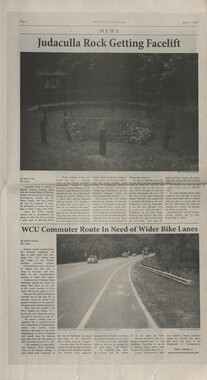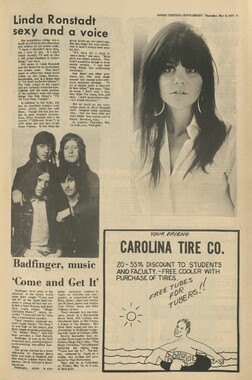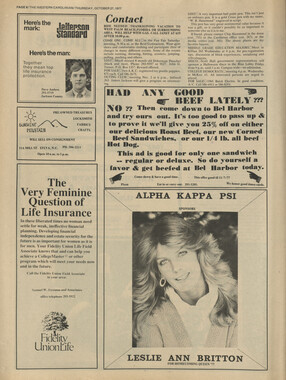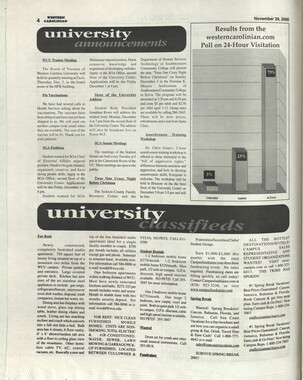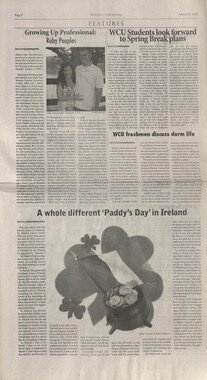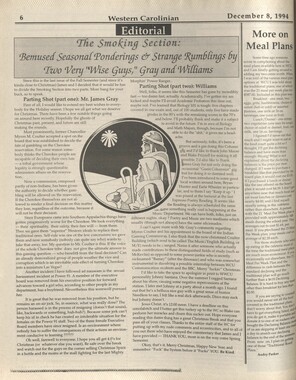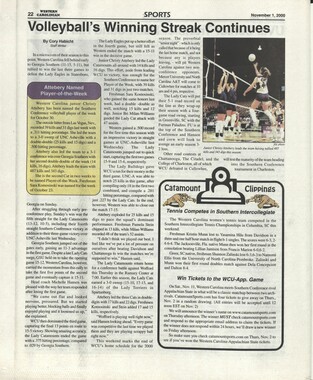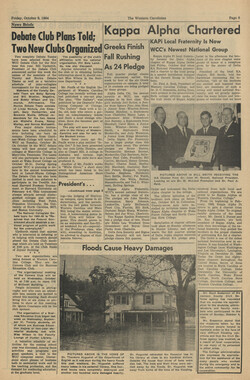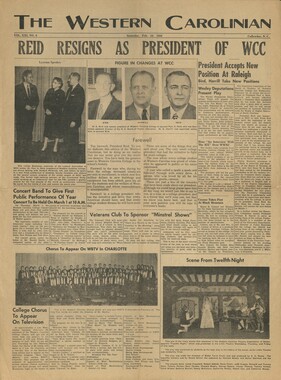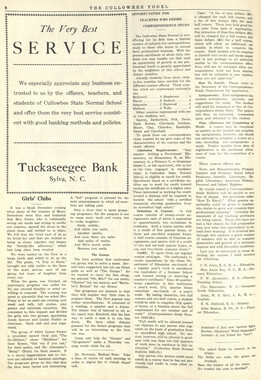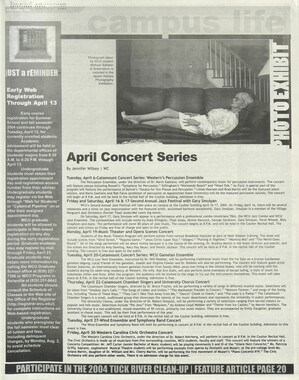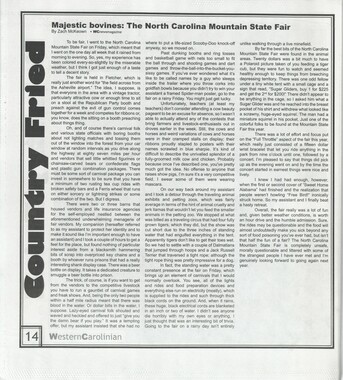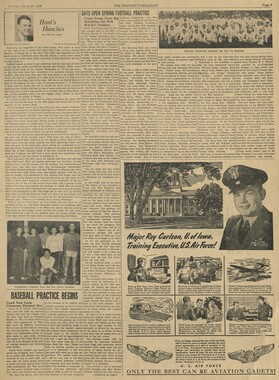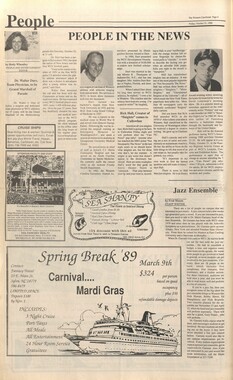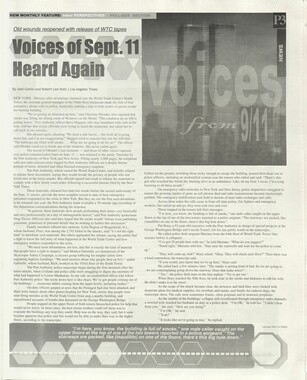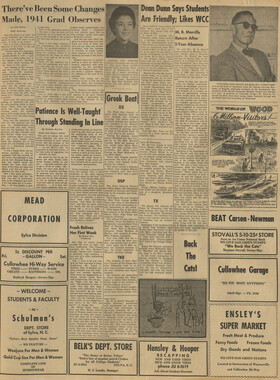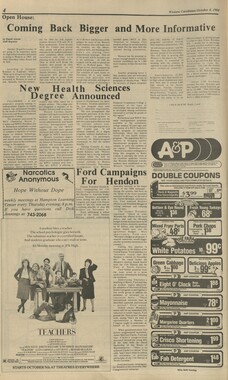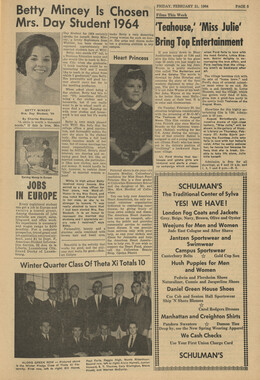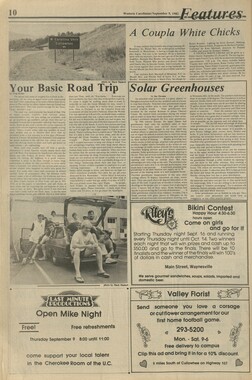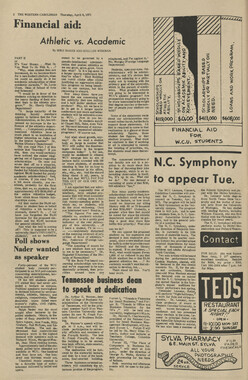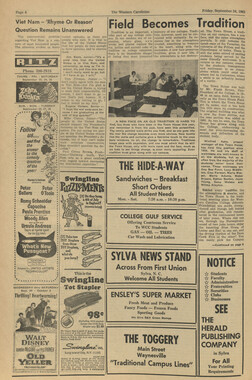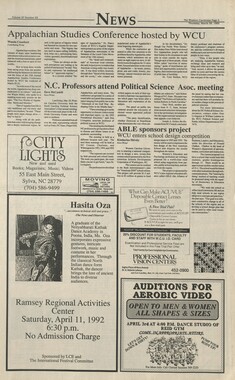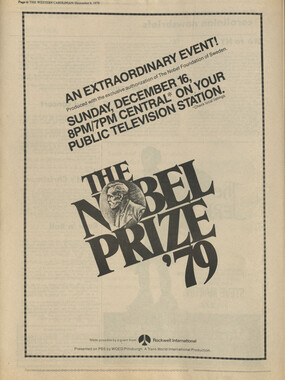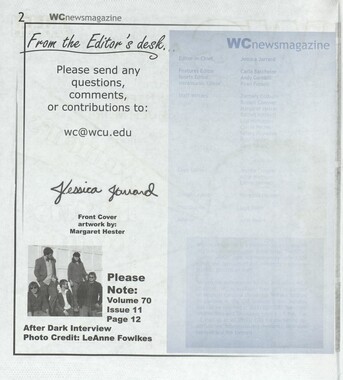Western Carolina University (20)
View all
- Canton Champion Fibre Company (2308)
- Cherokee Traditions (291)
- Civil War in Southern Appalachia (165)
- Craft Revival (1942)
- Great Smoky Mountains - A Park for America (2946)
- Highlights from Western Carolina University (430)
- Horace Kephart (941)
- Journeys Through Jackson (159)
- LGBTQIA+ Archive of Jackson County (85)
- Oral Histories of Western North Carolina (314)
- Picturing Appalachia (6873)
- Stories of Mountain Folk (413)
- Travel Western North Carolina (160)
- Western Carolina University Fine Art Museum Vitreograph Collection (129)
- Western Carolina University Herbarium (92)
- Western Carolina University: Making Memories (738)
- Western Carolina University Publications (2491)
- Western Carolina University Restricted Electronic Theses and Dissertations (146)
- Western North Carolina Regional Maps (71)
- World War II in Southern Appalachia (131)
University of North Carolina Asheville (6)
View all
- Allanstand Cottage Industries (62)
- Appalachian National Park Association (53)
- Bennett, Kelly, 1890-1974 (1463)
- Berry, Walter (76)
- Brasstown Carvers (40)
- Carver, George Washington, 1864?-1943 (26)
- Cathey, Joseph, 1803-1874 (1)
- Champion Fibre Company (233)
- Champion Paper and Fibre Company (297)
- Cherokee Indian Fair Association (16)
- Cherokee Language Program (22)
- Crowe, Amanda (40)
- Edmonston, Thomas Benton, 1842-1907 (7)
- Ensley, A. L. (Abraham Lincoln), 1865-1948 (275)
- Fromer, Irving Rhodes, 1913-1994 (70)
- George Butz (BFS 1907) (46)
- Goodrich, Frances Louisa (120)
- Grant, George Alexander, 1891-1964 (96)
- Heard, Marian Gladys (60)
- Kephart, Calvin, 1883-1969 (15)
- Kephart, Horace, 1862-1931 (313)
- Kephart, Laura, 1862-1954 (39)
- Laney, Gideon Thomas, 1889-1976 (439)
- Masa, George, 1881-1933 (61)
- McElhinney, William Julian, 1896-1953 (44)
- Niggli, Josephina, 1910-1983 (10)
- North Carolina Park Commission (105)
- Osborne, Kezia Stradley (9)
- Owens, Samuel Robert, 1918-1995 (11)
- Penland Weavers and Potters (36)
- Roberts, Vivienne (15)
- Roth, Albert, 1890-1974 (142)
- Schenck, Carl Alwin, 1868-1955 (1)
- Sherrill's Photography Studio (2565)
- Southern Highland Handicraft Guild (127)
- Southern Highlanders, Inc. (71)
- Stalcup, Jesse Bryson (46)
- Stearns, I. K. (213)
- Thompson, James Edward, 1880-1976 (226)
- United States. Indian Arts and Crafts Board (130)
- USFS (683)
- Vance, Zebulon Baird, 1830-1894 (1)
- Weaver, Zebulon, 1872-1948 (58)
- Western Carolina College (230)
- Western Carolina Teachers College (282)
- Western Carolina University (2008)
- Western Carolina University. Mountain Heritage Center (18)
- Whitman, Walt, 1819-1892 (10)
- Wilburn, Hiram Coleman, 1880-1967 (73)
- Williams, Isadora (3)
- Cain, Doreyl Ammons (0)
- Crittenden, Lorraine (0)
- Rhodes, Judy (0)
- Smith, Edward Clark (0)
- Appalachian Region, Southern (2569)
- Asheville (N.C.) (1923)
- Avery County (N.C.) (26)
- Blount County (Tenn.) (195)
- Buncombe County (N.C.) (1672)
- Cherokee County (N.C.) (283)
- Clay County (N.C.) (555)
- Graham County (N.C.) (236)
- Great Smoky Mountains National Park (N.C. and Tenn.) (519)
- Haywood County (N.C.) (3569)
- Henderson County (N.C.) (70)
- Jackson County (N.C.) (4912)
- Knox County (Tenn.) (35)
- Knoxville (Tenn.) (13)
- Lake Santeetlah (N.C.) (10)
- Macon County (N.C.) (420)
- Madison County (N.C.) (215)
- McDowell County (N.C.) (39)
- Mitchell County (N.C.) (132)
- Polk County (N.C.) (35)
- Qualla Boundary (982)
- Rutherford County (N.C.) (76)
- Swain County (N.C.) (2182)
- Transylvania County (N.C.) (270)
- Watauga County (N.C.) (12)
- Waynesville (N.C.) (86)
- Yancey County (N.C.) (72)
- Aerial Photographs (3)
- Aerial Views (60)
- Albums (books) (4)
- Articles (1)
- Artifacts (object Genre) (228)
- Bibliographies (1)
- Biography (general Genre) (2)
- Cards (information Artifacts) (38)
- Clippings (information Artifacts) (191)
- Copybooks (instructional Materials) (3)
- Crafts (art Genres) (622)
- Depictions (visual Works) (21)
- Design Drawings (1)
- Drawings (visual Works) (185)
- Envelopes (73)
- Exhibitions (events) (1)
- Facsimiles (reproductions) (1)
- Fiction (general Genre) (4)
- Financial Records (12)
- Fliers (printed Matter) (67)
- Glass Plate Negatives (381)
- Guidebooks (2)
- Internegatives (10)
- Interviews (815)
- Land Surveys (102)
- Letters (correspondence) (1013)
- Manuscripts (documents) (618)
- Maps (documents) (177)
- Memorandums (25)
- Minutes (administrative Records) (59)
- Negatives (photographs) (6090)
- Newsletters (1290)
- Newspapers (2)
- Notebooks (8)
- Occupation Currency (1)
- Paintings (visual Works) (1)
- Pen And Ink Drawings (1)
- Periodicals (193)
- Personal Narratives (10)
- Photographs (12976)
- Plans (maps) (1)
- Poetry (5)
- Portraits (4568)
- Postcards (329)
- Programs (documents) (181)
- Publications (documents) (2443)
- Questionnaires (65)
- Relief Prints (26)
- Sayings (literary Genre) (1)
- Scrapbooks (282)
- Sheet Music (2)
- Slides (photographs) (402)
- Songs (musical Compositions) (2)
- Sound Recordings (796)
- Specimens (92)
- Speeches (documents) (18)
- Tintypes (photographs) (8)
- Transcripts (322)
- Video Recordings (physical Artifacts) (23)
- Text Messages (0)
- A.L. Ensley Collection (275)
- Appalachian Industrial School Records (7)
- Appalachian National Park Association Records (336)
- Axley-Meroney Collection (2)
- Bayard Wootten Photograph Collection (20)
- Bethel Rural Community Organization Collection (7)
- Blumer Collection (5)
- C.W. Slagle Collection (20)
- Canton Area Historical Museum (2110)
- Carlos C. Campbell Collection (462)
- Cataloochee History Project (64)
- Cherokee Studies Collection (4)
- Daisy Dame Photograph Album (5)
- Daniel Boone VI Collection (1)
- Doris Ulmann Photograph Collection (112)
- Elizabeth H. Lasley Collection (1)
- Elizabeth Woolworth Szold Fleharty Collection (4)
- Frank Fry Collection (95)
- George Masa Collection (173)
- Gideon Laney Collection (452)
- Hazel Scarborough Collection (2)
- Hiram C. Wilburn Papers (28)
- Historic Photographs Collection (236)
- Horace Kephart Collection (861)
- Humbard Collection (33)
- Hunter and Weaver Families Collection (1)
- I. D. Blumenthal Collection (4)
- Isadora Williams Collection (4)
- Jesse Bryson Stalcup Collection (47)
- Jim Thompson Collection (224)
- John B. Battle Collection (7)
- John C. Campbell Folk School Records (80)
- John Parris Collection (6)
- Judaculla Rock project (2)
- Kelly Bennett Collection (1482)
- Love Family Papers (11)
- Major Wiley Parris Civil War Letters (3)
- Map Collection (12)
- McFee-Misemer Civil War Letters (34)
- Mountain Heritage Center Collection (4)
- Norburn - Robertson - Thomson Families Collection (44)
- Pauline Hood Collection (7)
- Pre-Guild Collection (2)
- Qualla Arts and Crafts Mutual Collection (12)
- R.A. Romanes Collection (681)
- Rosser H. Taylor Collection (1)
- Samuel Robert Owens Collection (94)
- Sara Madison Collection (144)
- Sherrill Studio Photo Collection (2558)
- Smoky Mountains Hiking Club Collection (616)
- Stories of Mountain Folk - Radio Programs (374)
- The Reporter, Western Carolina University (510)
- Venoy and Elizabeth Reed Collection (16)
- WCU Gender and Sexuality Oral History Project (32)
- WCU Mountain Heritage Center Oral Histories (25)
- WCU Oral History Collection - Mountain People, Mountain Lives (71)
- WCU Students Newspapers Collection (1923)
- Western North Carolina Tomorrow Black Oral History Project (69)
- William Williams Stringfield Collection (2)
- Zebulon Weaver Collection (109)
- African Americans (390)
- Appalachian Trail (35)
- Artisans (521)
- Cherokee art (84)
- Cherokee artists -- North Carolina (10)
- Cherokee language (21)
- Cherokee pottery (101)
- Cherokee women (208)
- Church buildings (189)
- Civilian Conservation Corps (U.S.) (111)
- College student newspapers and periodicals (2012)
- Dams (107)
- Dance (1023)
- Education (222)
- Floods (61)
- Folk music (1015)
- Forced removal, 1813-1903 (2)
- Forest conservation (220)
- Forests and forestry (1184)
- Gender nonconformity (4)
- Great Smoky Mountains National Park (N.C. and Tenn.) (181)
- Hunting (45)
- Landscape photography (25)
- Logging (119)
- Maps (83)
- Mines and mineral resources (8)
- North Carolina -- Maps (18)
- Paper industry (38)
- Postcards (255)
- Pottery (135)
- Railroad trains (72)
- Rural electrification -- North Carolina, Western (3)
- School integration -- Southern States (2)
- Segregation -- North Carolina, Western (5)
- Slavery (5)
- Sports (452)
- Storytelling (243)
- Waterfalls -- Great Smoky Mountains (N.C. and Tenn.) (66)
- Weaving -- Appalachian Region, Southern (280)
- Wood-carving -- Appalachian Region, Southern (328)
- World War, 1939-1945 (173)
Western Carolinian Volume 51 Number 07
Item
Item’s are ‘child’ level descriptions to ‘parent’ objects, (e.g. one page of a whole book).
-
-
Page 4 WESTERN CAROLINIAN MARCH 6, 1986 Western Carolinian (704) 227-7267 Western Carolina University P.O Box 66Cullowhee, North Carolina 2H7ZS Randy Rosenthal Editor in Chief Sherra Robinson News Editor Cheryl Davis Business Manager Billy Graham Sports Editor Jeffrey Richards and Andy Atkin Design Editors Tonya Lamm Proofreader Design/Production Kevin Kirkpatrick Tonya Lamm Lainie Covington Advertising Manager Paula S. Koon The WESTERN CAROLINIAN is published weekly by the Publication Board of Western Carolina University. It is an independent student publication that receives its fundi ng throug h student activities fees and advertising. Subscriptions are available at $16.00 per year ($20.00 Canada). The WESTERN CAROLINIAN is printed at the Waynesville Mountaineer in Waynesville, N.C. r guest editorial The Unmentionable Epidemic by Daniel McCann Duffy This Spring Break get a suntan, not AIDS! During 1979, the AIDS virus infected an average of 7 people each day. Today, the AIDS virus infects more than 1,000 people each day. Of the 1,000 people infected each day, at least 300 will develop AIDS. Ninety percent of the victims are between the ages of 20 and 49. The average lifespan of a person diagnosed with AIDS is56 weeks. No one diagnosed as having AIDS has lived longer than five years. Presently, there is no cure or vaccine. According to The Harvard Medical School Health Letter, "Forevery person in the United States who has AIDS or one of the related conditions, there are 40 to 50 who are carrying the virus but do not know it." People with the AIDS virus can spread AIDS even though they do not have^AIDS themselves. An estimated 1 to 2 million Americans are currently infected with the AIDS virus. The National Cancer Institute in Washington has found that one-third of a group in New York City who showed signs of exposure to the virus in 1982 have since developed AIDS. Barring any unforseen medical breakthrough, at least 300,000 Americans will contract AIDS in the coming five years. This is six times the number of Americans killed in combat during the Vietnam War. AIDS relentlessly destroys the human body's immune system, leaving the victim prey to a number of infections and eventually fatal diseases. Some symptoms of AIDS are persistent swollen glands, headaches, recurrent fever, night sweats, fatigue, weight loss, and a dry cough. Al DS is not a Gay Plague. Available evidence indicates that AIDS is transmitted from person to person through blood, plasma, body organs, tissues, and semen. In the homosexual community, the virus is spread through semen and the rectal bleeding that often accompanies the trauma of anal intercourse. The multiplicity of sexual partners has hastened the spread of AIDS in the Gay community. However, homosexuals do not comprise the entire high risk group for AIDS. Other high risk groups include bisexuals, intravenous drug users, recipients of blood products and body organs, prostitutes, and sexual partners of all these individuals. The last category appears to be AIDS "portal of entry" into the heterosexual world. The virus is transmitted from infected male to female primarily through the semen. The virus has also been documented to be spread from infected woman to" man. A possible method of transmission is thought to be the woman's blood that can be in a woman's vagina from either her menstrual period or an abrasion. Infected prostitutes are believed to be rapidly spreading the AIDS virus into the heterosexual population. The Chicago Health Commissioner recently warned the public that "All persdns who utilize the services of male or female prostitutes are at risk of contracting AIDS." In Africa, 10 million Africans are infected with the virus. The primary means of transmission is believed to be heterosexual contact. The ratio of male to female African AIDS victims is about 1 to 1. In the United States, the average AIDS patient spends a total of 167 days in a hospital at a cost of $147,000. This cost is usually borne by the state and federal government. Therefore, treatment for the 300,000 future AIDS patients could cost us, as American taxpayers, $42 billion in 1990. In spite of these facts, Congress has allocated only $238 million for | AIDS research for the 1986 fiscal year. More alarming, the President's 1987 proposed AIDS research budget asks for $195 million, $43 million less than the 1986 allocation. Many of our nation's leaders are afraid to confront the AIDS challenge for fear that their own sexuality and morality might be questioned. The "epidemic of fear" that'AIDS engenders includes fear of recognizing AIDS or openly helping AIDS victims. We must courageously ask our elected officials to enact a massive AIDS public education campaign. Presently, education is the best vaccination. Also, we must ask this Administration and Congress to have the fiscal wisdom to allocate a multi-billion dollar appropriation for AIDS research this year. Research discoveries may prevent Americans from being saddled with the looming $42 billion AIDS medical bill. By acting with courage in the face of the AIDS challenge, we will protect the lives of millions of American citizens and the productive and financial resources of ourcountry. By showing compassion to the AIDS victims of today, we will prevent ourselves from being personal or economic AIDS victims of tomorrow. Copyright 1986 Ellen Goodman Not In Front Of The Children When our children were little, my sister and I would occasionally use our own private language around them, a summer-camp lingo we called uppy-duppy. Our parents had a more sophisticated strategy to deal with us: polysyllabic words, telegraphed spelling messages. Their parents in turn had an adults-only language that had been imported from Europe. What all three generations shared was a desire to keep some information from the young. There were subjects that came with an invisible label—Not In Front Of The Children. Sometimes we applied it for their protection, sometimes for our privacy, but it separated stages of childhood and adulthood. There was nothing unusual about us. There have always been ways for an older generation to shut out the younger, to blocktheir access to information, to apply a rating system. Language is one, doors are another. Children have been routinely removed from the room during "grown-up conversations," or fights, or tears. But it is different now. Our grandparents had a whole list of taboos: death, sex, c-a-n-c-e-r, m- o-n-e-y. Our own uppy-duppy era was much shorter and less serious. Modern parents, after all, are much more open with their children. Or so we tell ourselves. Still, at times I wonder whether we haven't lost the power to screen the adult world for and from our children. Last week, a friend tells me, the talk of the second-grade car pool was of Tylenol. They found out about the cyanide on the evening news. This morning, an eighth- grade teacher calls in dismay to report the munber of her students who have seen "adult" movies on cable-TV or videos. Last month, the space shuttle exploded before thousands of school children's eyes. No father broke the news, no mother framed the event, no grandparent translated the information. Young and old saw this together. The best that these elders could do was to react, to play catchup, to help children understand what they had seen. The adult screen has been virtually wiped out by the television screen. There is a moment in Joshua Meyrowitz' "No Sense of Place," a striking analysis of television's impact on our culture, when he describes how TV has blurred the lines between childhood and adulthood. "What is revolutionary about television is not that it necessarily gives children 'adult minds,'" he writes, "but that it allows the very young child to be 'present' at adult interactions. "The widespread use of television is equivalent to a broad social decision to allow young children to be present at wars and funerals, courtships and seductions, criminal plots and cocktail parties....(Television) exposes them to many topics and behaviors that adults have spent centuries trying to keep hidden from children." Death, d-i-v-o-r-c-e, or as we say in uppy-duppy, "s-up- ex." . Perhaps the biggest secret that has been blown is about adulthood itself. When Meyrowitz analyzed programs as different as the 1950s' "Leave It To Beaver" and the 1980s' "One Day At A Time," he found something similar: "They both reveal to children the existence of adult weaknesses and doubts. Television lets children know what we are saying in the other language and what is going on behind the closed door. This exposure, he writes, "undermines both traditional childhood naivete and the all-working, confident adult role..." In the electronic age, the parent is less of a guide and more of a fellow traveler. We don't slowly expose our children to the world in a series of monitored field trips anymore. We don't control the flow of information into their lives. It comes through a garrulous and pemmanent guest who doesn't respond to the command, "Shh, the children." As parents we are brought the questions raised in our children's minds by the set in the living room. It is both harder to protect those children and harder to pretend to them. When they ask us to explain what is happening in Manila or Dallas, we cannot speak in tongues. Our own parents, certainly our grandparents, kept too muchfrom us. Many kept themselves from us. As thoroughly modern parents of the electronic age, we comfort ourselves with the notion that we are choosing this "honesty" and, yes, "openness." I just hope that our own children aren't left more v- u-l-n-e-r-a-b-l-e. George Will n WASHINGTON-Justice delayed is justice denied, so justice demands that someone say this: ,lt is not true that young adults read nothing but T-shirts and books of cartoons. You must look all the way down to fourth place on the current list of campus best-sellers to find a cartoon book, and all the way to seventh place to fine one about Garfield the cat. The best seller deserves to be. It is Garrison Keillor's "Lake Wobegon Days." And young adults even have a kind of cult book. It is Jay Mclnerney's novel, "Bright Lights, Big City." It has something like the cachet "Catcher in the Rye" had in the golden age of college youth (meaning when I was in college). Indeed, a critic says "Bright Lights" is "the 'Catcher in the Rye' of the MBA set." From the royalties, 'Mclnerney bought a BMW, naturally. He has perfect pitch for the inner music of upscale young professionals networking on the fast track. His novel is the Michelob beer commercial re-invented as literature. It chronicles one picturesque week in the life of a 1980's Holden Caulfield who is failing life as a fact- checker at a magazine as full of Literature for the Upwardly Mobile itself as the New Yorker. The novel's prefatory quotation is from "The Sun Also Rises": "How did you go bankrupt?" Bill asked. "Two ways," Mike said. "Gradually and then suddenly." The novel appeals to people mightily concerned about more consumption and other sources of derivative identity. It suggests the state of mind (well, state of something) that has been called Transcendental acquisition, spelled R-O-L-E-X. Something bad is "too NewJersey for words." A grating voice sounds like "the NewJeresystate anthem." Tacky girls have "an outer- borough look." What is good? Bloomingdale's, and a "J. Press torso," and Twining's breakfast tea. And, always, croissants. The protagonist is a downwardly mobile young man with a bad habit of "hoovering" cocaine and a tedious habit of wondering who he is. The novel begins: "You are not the kind of guy who would be at a place like this at this time of morning." What other kind of guy isn't he? When in a disreputable night club: "your presence here is only...reminding yourself of what you aren't." Yet again: "You see yourself as the kind of guy who appreciates a quiet night at home with a good book. A little Mozart on the speakers...." "You see yourself as the kind of guy who wakes up early on Sunday morning and steps out to cop the Times and croissants. Who might take a cue from the Arts and Leisure section....The kind of guy who...." Style and substance merge in the use of the second-person pronoun, the tone of voice of the self-absorbed. It is the voice of those Michelob commercials swarming with baby-boomers merrily gentrifying brownstones: "You have a style in your life...You're on the way to the top.... You've always known just who you are." Mclnerney's protagonist hasn't a clue who he is. In Mclnerney's second novel, "Ransome, " the protagonist of that name is a Beverly Hills boy disgusted with dad who is-yuckl- in television. Ransome goes to earth in Japan and converts (it is a demi-semi-religion for him) to karate, the practice of which "conveyed an extraordinary sense of self-possession." Here we go again, more "selfs" being shopped for and possessed. In sense, Mclnerney is traditionaal to the point of being hidebound. Nothing is more traditional than the theme of alienated youth, especially youth alienated from vulgar dad. Mclnerney makes that theme into a medley with the tested theme of flight abroad into strange lands and self-discovery. "He felt that the discipline would tone all of his being. It was his way of knowing himself." Mclnerney at his worst is nine yards better than another hot new author, Bret Easton Ellis, whose "Less Than Zero" is the worst novel since the invention of movable type. It is about yet another alienated Beverly Hills boy who likes cocaine about as much as he dislikes dad, who is in television. Alienated? The book begins: "People are afraid to merge on freeways in Los Angeles." Get it? Mclnerney's keen ear for trendy-babble does make him very fun ny in life as well as i n fiction. When he went to Hollywood to sell "Bright Lights," he says, "They told me they were putting me up at Chateau Marmont and I said, 'Is that good?' And they said, 'Is it good? John Belushi died there!'" We have not heard the last, or the best, from a man with an ear for stuff like that. Campus Beefs By Tracey Gasperini If it's not one thing... ATTENTION CAROLINIAN STAFFERS!! Western Carolinian Staff Meeting to be held Thursday Evening at 7:30 PM. Important business to be covered! All others who are interested please attend. If it isn't one cafeteria problem, it's another. How about the teen-age girls who are supposedly working in Dodson? I'm amazed that they actually receive a paycheck for all the foolishness they participate in. If it isn't just plain disruptive flirting with some of the students, it's poor service, or childish behavior such as throwing food at each other. Come on cafeteria staff, get rid of these irresponsible children and hire young people who are willing to work for their pay. The cafeteria system earns a profit, so let's see it run like a respectable business. Also, students need to straighten their act up and behave like responsible adults. I am referring to the people whocut line and leave trays and trash behind when they leave. Your mother isn't there to clean up behind you, and we're tired of people who don't have enough integrity to stand in line like everyone else. Those of you who wait your turn are to be commended, and it's time for you to stop tolerating people who cut. Speak out! Confront them, and make them go to the end of the line. If they give you a hassel, turn them into the cafeteria staff. The cafeteria's regulations prohibit line-cutting, so don't get in a fight with the violators, let the staff resolve the issue. The biggest issue facing the student body now is the upcoming SGA elections. It's rather nice of Chris Geis to interview himself, Lloyd, and Todd, all in the issue that announces his candidacy. This sudden SGA activism is out of the norm for a sports writer, but it's good politics, right? In the interview, Davis claims that credit cards, nuclear waste stand, and jurisdictional duties are some of the SGA's major accomplish ments. He is also quick to point out that his administration is responsible for the future alteration of the cafeteria system, and the implementation of the designated driver program. Well, let's take a look at these "accomplishments" and see what kind of effect they have on the student body. "Credit cards" are eyewash as far as most students are concerned. There's no wonder the faculty and staff are giving him a "tremendous response." The card is more appropriate for their needs, and the benefits to the average student are minimal. Who's welfare is he looking out for? The Nuclear Waste isse is a worthy cause, but is not so powerful as to be worthy of being a major accomplishment-unless little else has been done. There was a big push from Mr. Davis to insure that Western was not left off the state SGA bandwagon. Bandwagons are good for publicity. It's also about time the jurisdictional duties of the SGA were utilized. However, it's already March. Will a speedy and public trial be given to these snowballers? In addition, this administration has not taken a stand on enforcing anyof the other eleven regulations as they are listed in the Student Handbook. Is it only appropriate to use this power when someone outside the university is effected? What about cheating, fraud, and theft? Are these causes not worthy of his administration's attention? The cafeteria has received a great deal of attention this year, and the anticipated alteration of the food system has been a Davis project. However, it was never presented to the campus administrators in the form discussed the entire fall semester. A survey was supposed to be sent out, and it's results were to be the weight behind the proposal. For some reason, this was never done. I 'm sure that Mr. Davis has a flowery response to this, but an effective leader would have insured that every task was completed. Imagine the impact on the proposal if the survey had been completed and included. There would be no hesitation in the implementation of a new system. And finally, we have the designated driver program. This is a very worthy program, but it was originated and developed by UNCA. The senate simply passed a resolution giving Davis the power to put WCU on UNCA's program. Now, go back and reflect on these "accomplishments." Less real effort has been put forth in these activities than the student body is led to believe. All this talk about concern for student welfare is like mouthwash; it's used to the individual's advantage, spit out, and washed down the drain — never to be seen or used again. Davis isn't the only one guilty of this; Hinote, a presidential candidate, is a gross abuser of the student welfare statement. Hinote seems to be mainly concerned with the overall appearance of his resume and where this position can take him. Lloyd has become extremely proficient at acting the part of a bureaucrat. The transition in his appearance over the last six months has indicated his desire to portray the "professional" image. In addition, his involvement in the NC National Guard and the Broyhill campaign has made him very good at playing politics. But, is this what you people want? An individual who enjoys dressing, talking, and acting like a bureaucrat. We need someone who's actions speak as loud or louder than his/her words. As the vice- Presidential Assistant, Hinote has done an average job. On many occasions, he has needed more prodding to move than Farmer Jones' mule. He has enjoyed the position as Parlimentarian, but he has been slow to follow up on senate actions or resolutions. Initiative and foresight are two qualifications that must be met by a presidential candidate. Additionally, this person needs to have high standards for both himself and the university. Hinote was one of the most vocal opponents of the move to increase the QPR requirement for the outstanding student award to a 3.0. He also intends on winning that award himself one day, so Ihe requirement would never be raised under his administration. The student body doesn't need someone who lowers the standards to accomodate Ihe students; we need someone who will pick the campus up by the boot straps and help promote academics, not just the fraternal social scene. We need higher standards to give us something to strive for and to help improve Western's image. Incidentally, Geis' freshman QPR was mentioned in the article, but no mention wasmadeofeitherhisnor Hinote's current QPR. Maybe that should tell us something. The time has come for a truly effective SGA administration. The Student Senate has made some progress this year, but more could have been done to benefit the students as a whole if we would have had an effective SGA President. Let's insure that we don't have the same problem again next year.
Object
Object’s are ‘parent’ level descriptions to ‘children’ items, (e.g. a book with pages).
-
The Western Carolinian is Western Carolina University's student-run newspaper. The paper was published as the Cullowhee Yodel from 1924 to 1931 before changing its name to The Western Carolinian in 1933.
-
